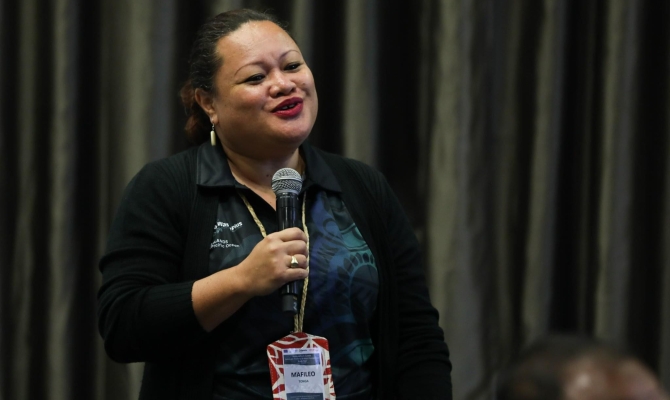
19 April 2024, Ottawa Canada - Despite the challenges associated with being a small island developing state, the Kingdom of Tonga is making significant strides towards addressing the very visible problem of plastics.
Tonga will soon finalise a National Plastics Roadmap aimed at phasing out single-use plastics (SUPs). This strategic roadmap will provide a clear pathway for targeted actions to achieve a cleaner environment and improve waste recycling strategies.
Tonga is one of 14 Pacific Island countries engaging in the fourth session of the Intergovernmental Negotiating Committee to develop an international legally binding instrument on plastic pollution, including in the marine environment (INC-4) from 23 to 29 April in Ottawa, Canada.
Ms Mafileo Masi, the Deputy Director, Department of Environment, Ministry of Meteorology, Energy, Information, Disaster Management, Environment, Climate Change and Communication, says her Government is committed to meet their international obligations under different multilateral environmental agreements.
“We have an obligation as a state to ensure what we negotiate and agree at the international level at multilateral environmental agreements is translated into tangible actions back home. In Tonga, we have a well-established legal framework for waste management but as with many other small island states we are finding it difficult to implement and enforce these frameworks,” Ms Masi said.
“The roadmap will help us focus on specific types of single-use plastics that we can realistically address with the resources we currently have. We conducted a comprehensive desktop review as part of developing this roadmap and this has helped us see what has worked and what hasn’t in other parts of the world so we are learning from these lessons and want to ensure we are not too ambitious in our plans but focussed and have achievable actions,” Ms Masi added.
The work on the Tonga Plastics Roadmap is supported by the Australian government-funded Pacific Ocean Litter Project (POLP) and the New Zealand High Commission in Tonga. POLP which is implemented by the Secretariat of the Pacific Environment Programme (SPREP) is working with 14 Pacific Islands to phase out specific types of single-use plastics from land-based sources, including household litter and tourism waste.
The islands of Tonga have a combined coastline of 419 kilometres, and a recent study (Jenna et al., 2015) indicates a daily plastic waste generation of approximately 22.7 tonnes (t).
An estimated 18.1t are mismanaged daily and are predicted to enter the marine environment through run-offs from uncontained disposal sites or by direct littering. Approximately 6,624t of plastic waste ended up in Tongan waters in 2010. If not addressed, the amount is expected to rise to 10,272t by 2025.
Since the 1950’s, the world has generated nine billion tonnes of plastic, for which only nine percent has been recycled. Over eight million tonnes of plastic enter the ocean each year with 40% of the ocean’s surface covered in plastic debris
If our plastic consumption and behaviour continues, scientists warn that there will be more plastic than fish in the ocean by 2050.
The fourth Intergovernmental Negotiating Committee to develop an international legally binding instrument on plastic pollution, including in the marine environment is taking place in Ottawa, Canada, from 23-29 April 2024
The Pacific Islands are represented by the Cook Islands, Federated States of Micronesia, Fiji, Kiribati, Marshall Islands, Nauru, Niue, Palau, Papua New Guinea, Samoa, Solomon Islands, Tonga, Tuvalu and Vanuatu through the support of the Government of Australia and the United Nations.
They are supported by the Secretariat of the Pacific Regional Environment Programme (SPREP), working with partners the Pacific Islands Forum Secretariat (PIFS), Office of the Pacific Ocean Commissioner (OPOC), The Pacific Community (SPC), Forum Fisheries Agency (FFA), Environmental Investigation Agency (EIA), Centre for International Environmental Law (CIEL), University of Wollongong, WWF and Massey University.
For more information visit: https://www.unep.org/inc-plastic-pollution/session-4